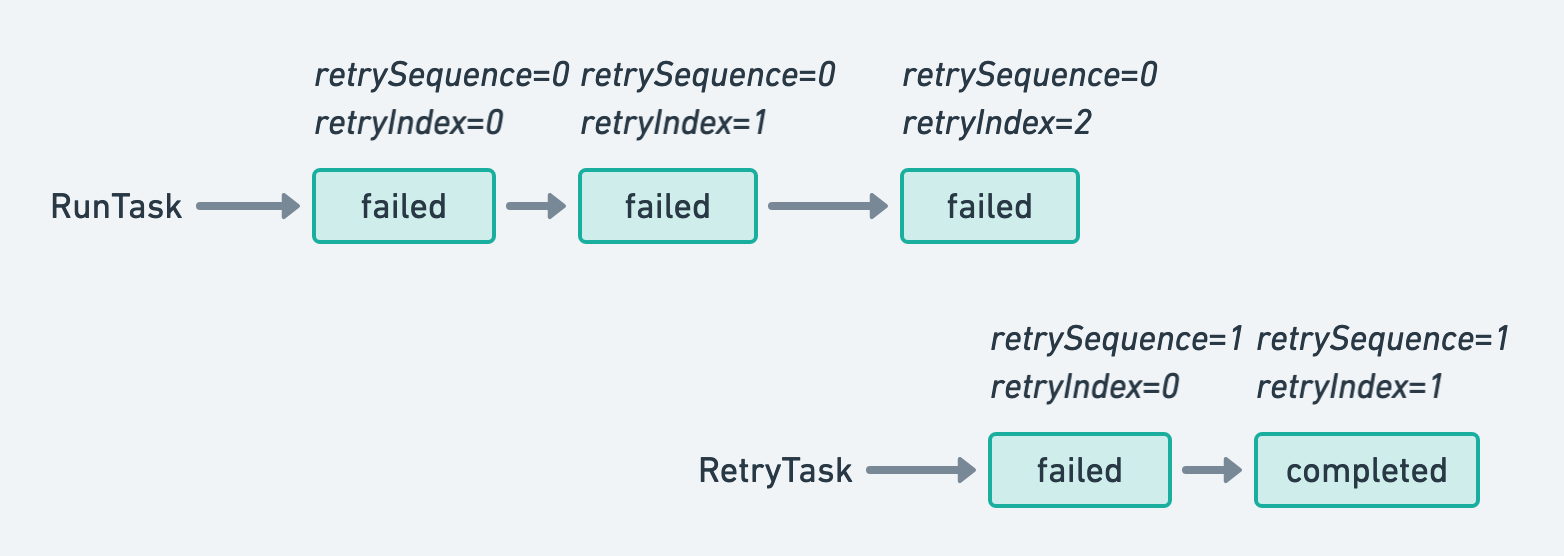Service
Task Context
In some cases, it is useful to understand more about the context in which a task is executed.
The io.infinitic.tasks.Task class provides the following static properties:
| Name | Type | Description |
|---|---|---|
taskId | String | Unique identifier of the task |
serviceName | String | Name of the Service (taken from the @Name annotation if provided, otherwise defaulting to the service's interface name) |
taskName | String | Name of the task (taken from the @Name annotation if provided, otherwise defaulting to the service's method name) |
workflowId | String? | Unique identifier of the workflow (if part of a workflow) |
workflowName | String? | Name of the workflow (if part of a workflow) |
tags | Set<String> | Tags provided when dispatching the task |
meta | Map<String, ByteArray> | Metadata provided when dispatching the task |
retryIndex | Integer | Number of times the task was automatically retried |
retrySequence | Integer | Number of times the task was manually retried |
lastError | TaskFailure? | The last error that occurred during the task execution |
batchKey | String? | If any, the batch key provided when the task was dispatched |
client | InfiniticClient | An InfiniticClient that can be used inside the task |
The task context is injected by the Service worker executing the task, and is only accessible from the thread that started:
- the task method
- the
getTimeoutSecondsmethod - the
getSecondsBeforeRetrymethod
In tests, io.infinitic.tasks.TaskContext can be mocked and injected through Task.setContext(mockedTaskContext) before running a test that uses the task's context.
tags
The tags property of the task context is an immutable set of strings. Its value is defined when dreating the Service stub before dispatching the task:
final HelloService helloService = newService(
HelloService.class,
tags = Set.of("userId" + userId, "companyId" + companyId)
);
val helloService = newService(
HelloService::class.java,
tags = setOf("userId:$userId", "companyId:$companyId")
)
meta
The meta property of the task context is a mutable map of strings to arrays of bytes. Its value is defined when creating the Service stub before dispatching the task:
final HelloService helloService = newService(
HelloService.class,
tags = null,
meta = Map.of(
"foo", "bar".getBytes(),
"baz", "qux".getBytes()
)
);
private val helloService = newService(
HelloService::class.java,
meta = mapOf(
"foo" to "bar".toByteArray(),
"baz" to "qux".toByteArray()
)
)
The meta property is mutable and can be read and write during the task execution and its retries.
retryIndex
The retryIndex property of the task context indicates the current number of retry attempts. It starts at 0 and is incremented when a task is automatically retried:

When a task is manually retried, the retryIndex property is reset to 0.
retrySequence
The retrySequence property of the task context indicates the current number of manual retries. It starts at 0 and is incremented when a task is manually retried:

lastError
If not null (when retryIndex >= 1), the lastError property is a data object representing the exception thrown during the last task attempt. This ExecutionError instance has the following properties:
| Name | Type | Description |
|---|---|---|
workerName | String | Name of the worker where the previous Exception was thrown |
name | String | Name of the previous Exception |
message | String | Message of the previous Exception |
stackTraceToString | String | Stringified stack trace of the previous Exception |
cause | ExecutionError? | Cause of the previous Exception |
